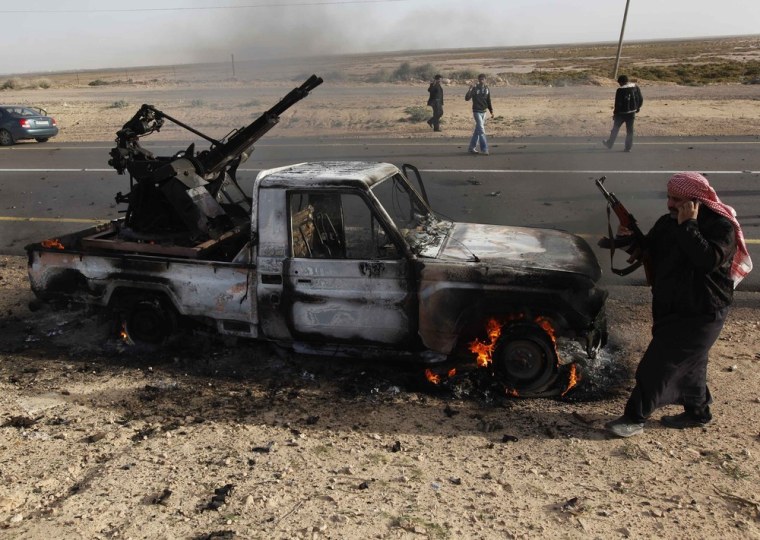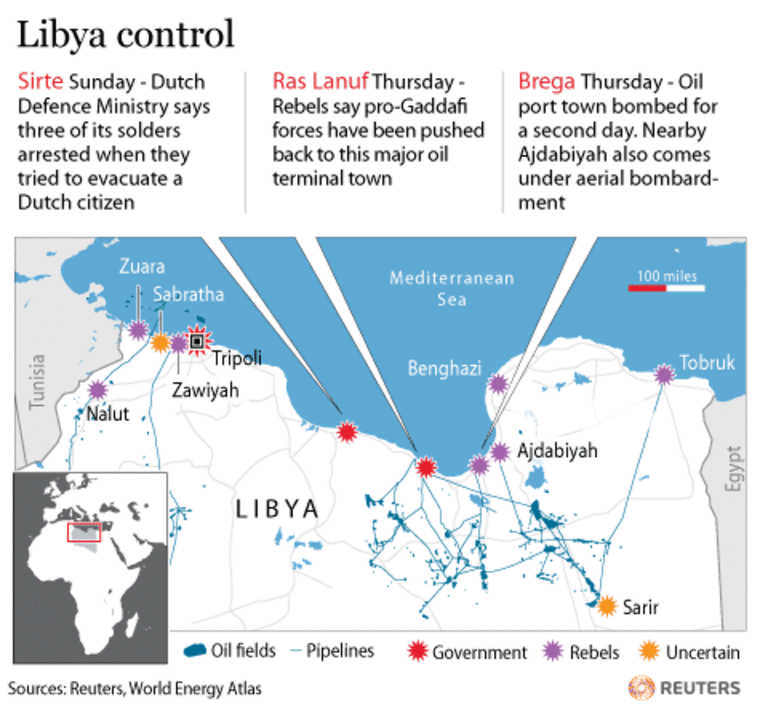Libyan leader Moammar Gadhafi and the president of the Arab League agreed to a peace plan from Venezuela's President Hugo Chavez to end the crisis in the North African country, a news network said on Thursday.
Chavez spoke to Gadhafi on Tuesday and laid out his proposal to seek a negotiated solution to the violence in Libya, Venezuela's Information Minister Andres Izarra said, without giving more details.
A senior government official contacted by Reuters said he did not know what Gadhafi had said about Chavez's idea to send representatives from several countries to Libya.
However, news network Al Jazeera said in a broadcast that during the call Gadhafi had accepted the plan, which would involve a commission from Latin America, Europe and the Middle East trying to reach a negotiated outcome between the Libyan leader and rebel forces.
Citing senior government sources, Al Jazeera's Caracas Correspondent Dima Khatib said via her Twitter feed that Venezuela's foreign minister had spoken with Arab League President Amr Moussa, who also agreed to the plan.
Earlier in the day Moussa took a tough line on Libya, saying the Arab League could impose a "no-fly zone" there to stop blood being spilled.
Chavez said the international community should seek a non-military solution to the conflict and accused the United States of exaggerating Libya's problems to justify an invasion.
A former soldier who survived massive protests and a coup against him in 2002, Chavez is a close friend of Gaddafi and has visited him several times.
Despite the report, oil prices held near 2-year highs on Thursday due to fears unrest could spread to other OPEC producers.
U.S. crude rose 0.2 percent to $102.47 a barrel, not far from the recent peak at $103.41, while Brent crude was also 0.2 percent higher at $116.63, closing in on the Feb. 24 high near $120.
Troops routed in attackReports of the offer's acceptance came a day after r
ebel forces routed troops loyal to Gadhafi in a fierce, topsy-turvy battle over an oil port, scrambling over the dunes of a Mediterranean beach through shelling and an airstrike to corner their attackers. The daylong fighting blunted the regime's first counteroffensive against opposition-held eastern Libya.
At least 10 anti-Gadhafi fighters were killed and 18 wounded in the battle over Brega, Libya's second largest petroleum facility, which the opposition has held since last week. Citizen militias flowed in from a nearby city and from the opposition stronghold of Benghazi hours away to reinforce the defense, finally repelling the regime loyalists.

In Tripoli Wednesday, Gadhafi vowed that "we will fight until the last man and woman." In a long, rambling speech he also warned that thousands of Libyans would die if U.S. and NATO forces intervened.
"We will not accept an intervention like that of the Italians that lasted decades," Gadhafi said, referring to Italy's colonial rule early in the 20th Century. "This will lead to a bloody war and thousands of Libyans will die if America and NATO enter Libya."
The attack on Brega began just after dawn, when several hundred pro-Gadhafi forces in 50 trucks and SUVs mounted with machine guns descended on the port, driving out a small opposition contingent and seizing control of the oil facilities, port and airstrip.
But by afternoon, they had lost it all and had retreated to a university campus 5 miles away.
There, opposition fighters besieged them, clambering from the beach up a hill to the campus as mortars and heavy machine gun fire blasted around them, according to an Associated Press reporter at the scene. They took cover behind grassy dunes, firing back with assault rifles, machine guns and grenade launchers. At one point a warplane struck in the dunes to try to disperse them, but it caused no casualties and the siege continued.
"The dogs have fled," one middle-aged fighter shouted, waving his Kalashnikov over his head in victory after the Gadhafi forces withdrew from the town before nightfall. Cars honked their horns and many people fired assault rifles in the air in celebration.
In other developments Wednesday:
- Rebels ask for foreign airstrikes. In Benghazi, Libya's second largest city and the stronghold of the rebellion in the east, a self-declared "interim government council" formed by the opposition called on foreign nations to carry out airstrikes on non-Libyan African mercenaries that Gadhafi has used in his militias to put down the uprising. Council spokesman Abdel-Hafiz Hoga said the council urged airstrikes on the "strongholds of the mercenaries .... used against civilians and people." The council was announced by opposition leaders headed by Gadhafi's former justice minister, Mustafa Abdel-Jalil, who joined the uprising.
- Arrests in Tripoli. Pro-Gadhafi militiamen launched a wave of raids in Tripoli to snatch people who participated in anti-government protests over the past week after identifying them in photos and video, several witnesses said. Dozens were arrested at their homes in dawn raids in the restive neighborhood of Tajoura, said one resident, whose two brothers were among those taken. "Seventeen cars with armed militia in uniform, they stormed the houses of my brothers. They blew the locks off the doors, they took the jewelry of my sister-in-law, money and my brothers," the resident said, speaking on condition of anonymity for fear of retaliation.
- Immigrants airlifted out. The turmoil has also sparked a massive exodus of 180,000 people — mostly foreign workers — who have fled to the borders, U.N. refugee agency spokeswoman Melissa Fleming said. European nations and Egypt launched emergency airlifts and sent ships to handle the chaotic flight. More than 77,000 so far have crossed into Egypt, and a similar number into Tunisia — with about 30,000 more waiting at that western border. Some Somali and Eritreans workers around Benghazi are feeling "hunted" as they are being mistaken for mercenaries hired by Gadhafi, she said, while Gadhafi forces appear to be targeting Egyptians and Tunisians, apparently believing they triggered the uprising. "(There are) many, many terrified refugees" in Tripoli who are too afraid to move for fear they will be killed, Fleming told AP.

Brega is the second-largest hydrocarbon complex in OPEC-member Libya. Amid the turmoil, exports from its ports have all but stopped with no ships coming to load up with crude and natural gas. Crude production in the southeastern oil fields that feed into the facility has been scaled back because storage facilities at Brega were filling up. General Manager Fathi Eissa said last week the facility has had to scale back production dramatically from 90,000 barrels of crude a day to just 11,000.
The unrest in Libya — which ranks about 17th among world oil producers and has Africa's largest proven oil reserves — has sparked a major spike in world oil prices. Overall crude production has dropped from 1.6 million barrels per day to 850,000.
Gadhafi's regime has been left in control of Libya's northwest corner, centered on Tripoli, but even there several cities have fallen into rebel hands after residents rose up in protests, backed by mutinous army units and drove out Gadhafi loyalists.
In recent days, loyalists succeeded in regaining two of those towns — Gharyan, a strategic town in the Nafusa mountains south of Tripoli, and Sabratha, a small town west of the capital.
But opposition fighters successfully repulsed attacks by pro-Gadhafi forces on several others:
- The key city of Zawiya outside the capital;
- Misrata, Libya's third largest city east of Tripoli; and
- Zintan, a town further southwest in the Nafusa mountains.
The regime may be bringing in more forces from regions it still dominates in the sparsely populated deserts in the southwest.
In his speech Wednesday, Gadhafi lashed out at international moves against his regime, including the freezing of his and other Libyan assets abroad — an act he called "piracy" — and efforts by Europe to send aid to opposition-held Benghazi.
He also threatened to bring in Chinese and Indian companies to replace Western companies in Libya's oil sector if the West keeps up its pressure on him. European firms are heavily involved in Libya's oil production.
Gadhafi insisted he was not in charge and so there was no president to be ousted by the revolt, as happened in neighboring Tunisia and Egypt. He claimed the country was run by people's committees.
"It's the people who exercise their own authority. The Libyan people are free to exercise power and authority in the manner they deem fit," he said.
No-fly zone 'challenging' Diplomats said Wednesday that some nations are talking about a no-fly zone modeled on those used over the Balkans in the 1990s.
But NATO has already said that any such move would require a clear mandate from the U.N. Security Council, and that is unlikely because Russia, which has veto power in the council, has already rejected the idea.
Gen. James Mattis, commander of U.S. Central Command, told a Senate hearing that imposing a no-fly zone would be a "challenging" operation. "You would have to remove air defense capability in order to establish a no-fly zone, so no illusions here," he said. "It would be a military operation."
However, Sen. John Kerry, chairman of the Senate Foreign Relations Committee, urged consideration of a no-fly zone and said Gadhafi must go.
"The people of Libya do not ask for or need foreign troops on the ground. They are committed to doing what is necessary, but they do need the tools to prevent the slaughter of innocents on Libyan streets and I believe the global community cannot be on the sidelines while airplanes are allowed to bomb and strafe," he said.
"A no fly-zone is not a long-term proposition and we should be ready to implement it as necessary," he added.